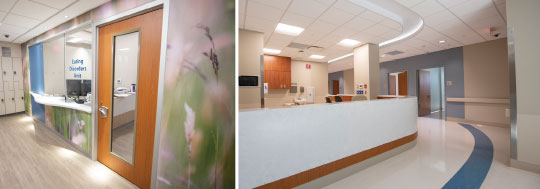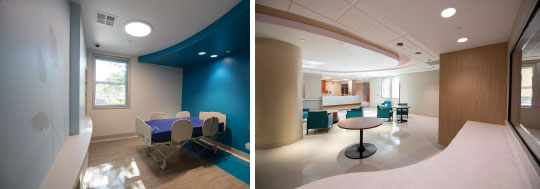

Design throughout the new Eating Disorders Unit incorporates features such as lighting that mimics daily changes in sunlight and soft, curving lines that foster a sense of relaxation. Imagery evokes natural themes that further promote calm, including on walls in the reception area and patient rooms, many of which are private. Spaces are designed to be flexible and adaptable to multiple uses.
A renovated unit features innovations for treatment and recovery.
Understanding the balance of physical, mental and social needs in people with severe—even life-threatening—eating disorders such as anorexia nervosa, bulimia nervosa and binge eating disorder has been the hallmark of treatment at the nationally recognized Eating Disorders Unit at Robert Wood Johnson University Hospital (RWJUH) Somerset for more than two decades.
Now the hospital has nearly completed a renovation that will transform the first-floor inpatient unit—one of only two inpatient eating disorders programs in New Jersey—into an even more advanced state-of-the-art facility. The unit uses the latest research and evidence-based design principles to simultaneously meet critical safety and security needs, enhance programming and promote healing and wellness.
“People with eating disorders often suffer from secondary mental health issues such as anxiety and depression on top of their primary disorder,” says Christine Belluardo, Vice President, Behavioral Health Services, RWJUH Somerset. “They’re quite ill when they come to us.”

Active Recovery
The program encourages recovery by helping patients develop inner resources such as understanding needs, identifying strengths and learning coping skills. “Our hope is to provide a well-rounded treatment plan and experience so when people leave, they can continue to use what they’ve learned with support from our team or with help from a partial hospital program like the one at RWJUH Somerset,” Belluardo says.
Innovative elements that emphasize calming connections to nature have brought national attention to the unit’s design. It was recognized in October 2021 at the national Healthcare Design Expo and Conference, where representatives from NK Architects and DCC Design Group discussed the project’s features.
“The patient rooms and entire milieu aesthetically contribute to an environment that promotes healing, wellness and recovery,” Belluardo says. Key research-based design elements include features like these:
Nature-Based Lighting
Indoor lighting changes to correspond with the brightening and dimming of natural sunlight throughout the day. “Attuning people to circadian, or daily, natural rhythms has been shown to be conducive to healing in behavioral health settings,” Belluardo says.
Relaxing Ambiance
Structural and decorative lines throughout the facility are designed to be soft and calm-inducing, often by incorporating curves, which are more common in nature than straight lines or hard angles.
References to Nature
Spaces such as the reception area feature natural images and colors to evoke the relaxing quality of living environments. The unit’s design concept also calls for direct patient access to dedicated garden spaces.
Flexibility
Many spaces are designed to meet a variety of needs and can accommodate a mix of uses such as active or quiet, open or private. The unit provides ample space for group activities that are key to the program’s recovery-based treatment, which helps patients develop resilience and coping skills through methods such as mindfulness and cognitive behavioral therapy.
Attractive Rooms
The renovation expands the number of patient rooms from 14 to 20. Many rooms are private. Design elements such as natural lighting, soft lines and nature-evoking imagery follow patients into these private spaces.
Age Separation
RWJUH Somerset’s unit is the only inpatient eating disorders program in New Jersey that separates adults and adolescents into distinct areas. “Best practice is to not have those patients together,” Belluardo says. “Adults and adolescents have different programming needs and levels of group engagement.”
For more information about Robert Wood Johnson University Hospital Somerset’s Eating Disorders Program, call 800-300-0628.